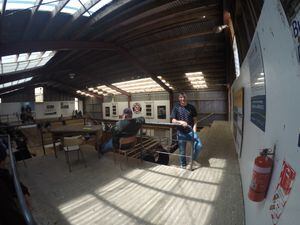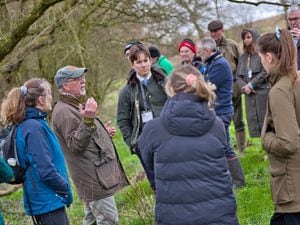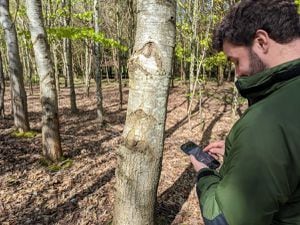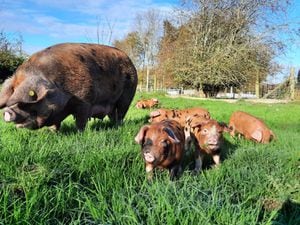Next Generation inspiration
By Richard Bower from New Zealand

We live in a cyclical world, don’t we? That has been one of the eye openers when travelling in New Zealand (NZ) last month and hearing the new coalition wanting to plant one billion trees to combat climate change. Many of the European settlers moved to NZ in the last 150 years, clearing areas of forests to sell timber and create farmland.
In the capital city Wellington, I caught up with a NZ Young Farmer friend, who works for the NZ Federated Farmers (Feds) their equivalent of our Farming Unions. My friend’s family has an 11,000 acre station, farming 20,000 sheep with five shepherds and 50 sheep dogs. Regrettably, we didn't get to visit the farm and we joked that I was the first international visitor not to do so!
We met at the Feds office in Wellington. It was very interesting to see how this building was also home to the NZ levy boards and the Red Meat Profit Partnership (RMPP). They all collaborate effectively being on different levels of the same building which is near to parliament.
Dairy is the biggest sector in NZ agriculture with cow numbers increasing by more than one million cows in recent years. I was shown the three different types of contract milking arrangements. I think this is a different culture to Europe, it was highlighted NZ Young Farmer clubs can change very quickly in regions where share milking is mainstream due to young farmers often moving farms.
The three types of share milking contracts:
1, Flat rate milking, where the farmer owns the cows and all of the assets and pays the milker a flat rate.
2, Variable order share milking, where the milker has more input and gets 20-30 per cent of the milk cheque.
3, Herd owning share milking, where the milker owns the cows and gets 50 per cent of the milk cheque.
The Feds sell standardised contract templates for their farmers, an idea that I liked. These mechanisms help farmers to grow (some with up to 16 large milking herds/farms), but also gives an opportunity for young farmers to get a step on the ladder. Around 80 per cent of the milk is sold through Fronterra co-operative which is owned by 10,000 shareholder farmers. This was formed by the government in 2000 through the Dairy Industry Restructuring Act and at the time had 90 per cent of the market.
Through the Act, Fronterra cannot reject milk supply from anywhere nationally and by law has to sell a proportion of its milk to its competitors. The milk price is set for the season and the farmer gets monthly instalments with uplift at the end of the season. It was highlighted being part of a cooperative, at times of high milk price the farmers did well but also at times of low milk prices the farmers can benefit by the cooperative/processor doing well in return paying its farmers a higher end of year dividend, which helped to offset the low milk price.
I think when we talk about agricultural policy in the UK, too much is about subsidy payments which are important in volatile times but the NZ system shows agricultural policy goes much further. The headlines are that NZ are subsidy free but this proves they still have mechanisms which help the farmers and maintain food security.
It must also be noted that even though dairy is the second largest part of the NZ economy behind tourism. It is being called 'Dirty Dairy' by some due to the amount of cows increasing nitrogen levels in ground water and irrigating grazing paddocks is lowering river levels.
The lessons I have learnt from NZ
NZ must be respected for their strategy for being low cost, keep it simple, efficient producers.
They are honest they want to have free trade with the rest of the world and to do this they want us to lose our subsidies.
Food is much more expensive in the NZ supermarkets (maybe it is too cheap in the U.K).
NZ fuel is cheaper with diesel retailing between £0.65 and £0.75 per litre.
There is no litter on the sides of NZ roads.
Agriculture inputs are advertised a lot in the mainstream media.
Agriculture is headline news in NZ, an example of this, 5,000 cows have recently been slaughtered on eight farms due to the spread of Mycoplasma Bovis.
While listening to a radio chat show, the deputy prime minister was nominated the most influential person in NZ Agriculture in 2017, when he was interviewed, he said, he wanted to devalue the NZ currency so exports were more competitive. I also read the new government wants to make it harder for foreign investors to buy farms, Canadian pension funds and Harvard Business School were quoted as currently owning NZ farms, they must be making a margin to invest.
Additionally, the NZ levy boards are voted in for seven year terms (longer than governments) they are voted on projects they want to implement over the seven-year terms. A few years ago the wool levy Board was voted against by the farmers, so it disappeared, the problem is, now some farmers want it back.
Finally, NZ agriculture was hit when we joined the EU as they lost part of our market, At the time they had 70 million sheep, now they have less than that number but claim to sell the same amount of meat.
Back home at Lower Drayton Farm in Staffordshire our BPS got paid on December 20, which we were grateful for.
While away I wrote a report on the 'vision of the future' of our business, this is something we have presented to the local district council planning department, we are involving them in our plans going forward to sweat all of our assets sustainably, spreading the risk of the business and highlighting, where we want to get to and how we plan to get there.
Phil Plant and his team from Mid West Planning has been helping us to draw up the farm plans and all of the family are involved so we all believe in the future and understand our collaborative roles to make it happen.
National Farmers Union
While in NZ the Staffordshire County NFU AGM elected me to become the Vice Chairman of Staffordshire NFU and nominated me to stand for election for NFU Vice President in the NFU national officeholder elections in February 2018. I am very grateful to Staffordshire farmers for giving me these opportunities. I truly believe in our industry being represented by a strong farming union which is lead by progressive farmers. It is an unprecedented step for a 31 year old to stand for national office for the NFU. I believe it is our generation whose careers will be shaped by the new Trade Deals, Regulations and Domestic Agricultural Policy, so it is important we are positioned at the table. I can complement an experienced NFU President and Deputy to make a dynamic officeholder team which will also make the NFU more credible to the wider industry and those on the outside looking in.
We've heard the word 'change' used at the Nuffield Farming Conference, Oxford Farming Conference and AHDB. I think we must drive change in the direction we want and make the most of every opportunity. There are internal changes the NFU can make to make farmers feel/get engaged and then there are the changes we can make to our crucial Agricultural Policy to drive a bright future.





